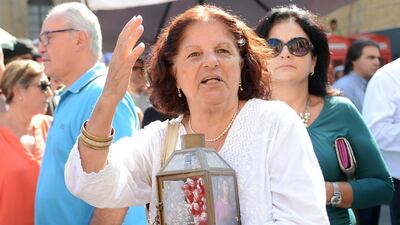After the failed threats, the mountain of legal cases and the denunciations from the prime minister downwards, it took a bomb to finally silence the forthright Maltese blogger Daphne Caruana Galizia.
Driven, demanding and judgmental, Ms Caruana Galizia – killed on Monday by a car bomb close to her home in northern Malta - was not a woman to hold back in her skewering of members of Malta’s elite.
The Politico website described her as “The Blogging Fury” and a “One-woman WikiLeaks” who used her blog Running Commentary to denounce cronyism within the police, bureaucracy and the political leadership of the European Union’s smallest member. “Alibaba will have no problem finding 40 thieves in Malta,” ran one typical headline.
_________
Read more:
Tour reveals shady Nigerian cash behind London luxury homes
Pakistan's top court rejects appeal against removal of Nawaz Sharif
_________
Her reporting had a direct impact. Her sustained criticism of Joseph Muscat, the current prime minister, over his links to shell companies exposed by the so-called Panama Papers prompted him to call a general election to end uncertainty and preserve the island’s economy.
Mr Muscat won the election in June but she has not relented in her opposition on her influential blog, which was read by 400,000 people on a good day, according to Politico. She gave evidence to the inquiry investigating her claims about Mr Muscat and her final message on Twitter referred to a senior member of his staff as “that crook”.
Her campaign against political corruption spanned the political divide. Since the election, she turned her fire on the new leader of the opposition, Adrian Delia, with a new series of scandalous stories that resulted in four new libel cases. They will be dropped following her death.
Both Mr Muscat and Mr Delia denounced the killing. “Everyone knows Caruana Galizia was a harsh critic of mine, both politically and personally, but nobody can justify this barbaric act in any way,” said Mr Muscat.
The 51-year-old had previously reported threats made against her, according to local media. Burning tyres were left against the door of her house 11 years ago in an unsuccessful murder attempt, her former newspaper reported on Tuesday.
“The capacity of chippy Maltese men to bear grudges against women for a life time never fails to amaze me,” she said in one typically forthright exchange with one former senior minister. “Join the queue.”
Ms Caruana Galizia’s death led to protests for justice outside the country’s law courts. Her last words on her blog – “There are crooks everywhere you look now. The situation is desperate” – were daubed on the side of a road. In a sign of the contrasting emotions that she provoked, one police officer who posted a message on Facebook saying that “Everyone gets what they deserve” was suspended from his post.
“Now what was many times foretold, threatened, wished for by people who despised her has finally happened,” the Malta Independent, a former employer, wrote in an editorial, adding that “no one was safe from her barbs”.
“There is a sort of inevitability in what happened. It makes Malta resemble all the more a Central or Latin American country where journalists are kidnapped, killed or just disappear.”
Even when her targets had employed expensive lawyers to push back against her claims, she refused to be cowed. She posted emails online from an exchange with one of the world’s leading libel firms Mishcon de Reya after its client took exception to stories about corruption over the government-sanctioned sale of Maltese passports to foreigners.
She gave evidence to EU lawmakers during a year-long investigation into the Panama Papers and the use of offshore jurisdictions to launder money and avoid taxation. Malta was the only EU country with a serving minister named in records leaked from the Panamanian law firm Mossack Fonseca.
Her son Matthew, a journalist and a witness to the aftermath of the blast, worked as part of the international team that published the leaked documents. In an emotional Facebook post, he blamed the failure of the country’s institutions for the death of his mother.
This is what war looks like, he wrote. “We are a people at war against the state and organised crime, which have become indistinguishable,” he wrote.
The original magistrate investigating the murder was replaced on Tuesday after the family pointed out that Ms Caruana Galizia had criticised him in one of her blogs. The WikiLeaks founder Julian Assange has offered a 20,000 euro reward for help in bringing her killer to justice.
Despite offers of assistance from the Dutch police and the FBI, the investigation will test a Maltese government blamed by Mr Caruana Galizia along with a “long list of police commissioners” for encouraging a “culture of impunity”.
On her blog, Ms Caruana Galizia shared that scepticism. When one supporter encouraged her to keep working and as the truth “always” prevailed, she responded: “It doesn’t you know, not really.”


